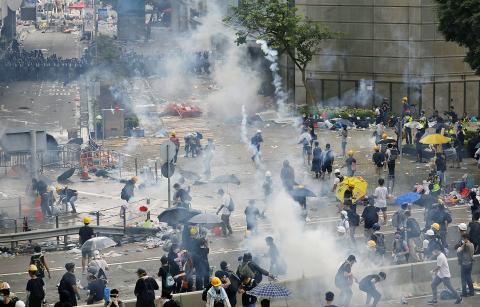Hong Kong stocks tumbled and the currency soared as interbank interest rates jumped amid protests that closed roads in the territory’s financial district.
The Hang Seng Index fell 1.7 percent at the close, with local property developers among the biggest losers, while the Hong Kong dollar strengthened as much as much as 0.26 percent, the largest gain in seven months.
The one-month interbank borrowing cost, known as the Hong Kong Interbank Borrowing Rate (HIBOR), rose 29 basis points to about 2.42 percent, the highest since 2008.

Photo: AP
While some analysts attributed the tighter liquidity to seasonal demand for cash, such as dividend payments, others said the protests — aimed at preventing the passage of a bill allowing Hong Kong to extradite its residents to mainland China — could be spurring concern about potential capital outflows.
The squeeze has driven up the cost of shorting the Hong Kong dollar, which also contributed to the one-day jump.
“Recent political events in Hong Kong are affecting investors’ confidence on the future of the city,” Springwaters Financial Securities (泓瑞源金融證券) Hong Kong-based strategist Sam Chi Yung (岑智勇) said by telephone. “A stronger local dollar may hurt exporters, while surging HIBORs mean higher funding costs for companies with more debt.”
The secretariat of Hong Kong’s Legislative Council postponed yesterday’s debate to an unspecified time after thousands converged on the legislature, blocking roads in tactics similar to the 2014 Occupy demonstrations.
Police fired tear gas in the afternoon, leading to some apparent injuries among protesters and officers.
US House of Representatives Speaker Nancy Pelosi threatened legislative action in the US Congress to “reassess” whether Hong Kong is sufficiently autonomous.
New World Development Co (新世界發展), Wharf Real Estate Investment Co (九龍倉置業) and Sun Hung Kai Properties Ltd (新鴻基地產) all fell at least 3.1 percent.
Developers are sensitive to Hong Kong’s rising borrowing costs and rallied earlier in the year on expectations the US Federal Reserve would cut interest rates.
Chinese Internet giant Tencent Holdings Ltd (騰訊) retreated 2.1 percent as the biggest drag on the Hang Seng China Enterprises Index, which lost 1.2 percent.
Sunny Optical Technology Group Co (舜宇光學) dropped 6.1 percent and AAC Technologies Holdings Inc (瑞聲科技) lost 3.4 percent.
Citigroup Inc cut its price target on Sunny, citing risks from a US ban on Huawei Technologies Co (華為).
Hong Kong’s two benchmarks were Asia’s worst performers in an otherwise quiet session in the region. The Hang Seng Index was only just recovering from a rout that had made it one of the world’s worst performing major benchmarks last month.
“Uncertainty on local policies will confuse investors and affect the flows in and out of Hong Kong stocks,” Partners Capital International Ltd (博大資本國際) CEO Ronald Wan (溫天納) said. “Investors now need to ponder whether or not to pull out of the market given the local events and global factors, including the trade war.”

NOT JUSTIFIED: The bank’s governor said there would only be a rate cut if inflation falls below 1.5% and economic conditions deteriorate, which have not been detected The central bank yesterday kept its key interest rates unchanged for a fifth consecutive quarter, aligning with market expectations, while slightly lowering its inflation outlook amid signs of cooling price pressures. The move came after the US Federal Reserve held rates steady overnight, despite pressure from US President Donald Trump to cut borrowing costs. Central bank board members unanimously voted to maintain the discount rate at 2 percent, the secured loan rate at 2.375 percent and the overnight lending rate at 4.25 percent. “We consider the policy decision appropriate, although it suggests tightening leaning after factoring in slackening inflation and stable GDP growth,”

DIVIDED VIEWS: Although the Fed agreed on holding rates steady, some officials see no rate cuts for this year, while 10 policymakers foresee two or more cuts There are a lot of unknowns about the outlook for the economy and interest rates, but US Federal Reserve Chair Jerome Powell signaled at least one thing seems certain: Higher prices are coming. Fed policymakers voted unanimously to hold interest rates steady at a range of 4.25 percent to 4.50 percent for a fourth straight meeting on Wednesday, as they await clarity on whether tariffs would leave a one-time or more lasting mark on inflation. Powell said it is still unclear how much of the bill would fall on the shoulders of consumers, but he expects to learn more about tariffs

Greek tourism student Katerina quit within a month of starting work at a five-star hotel in Halkidiki, one of the country’s top destinations, because she said conditions were so dire. Beyond the bad pay, the 22-year-old said that her working and living conditions were “miserable and unacceptable.” Millions holiday in Greece every year, but its vital tourism industry is finding it harder and harder to recruit Greeks to look after them. “I was asked to work in any department of the hotel where there was a need, from service to cleaning,” said Katerina, a tourism and marketing student, who would

i Gasoline and diesel prices at fuel stations are this week to rise NT$0.1 per liter, as tensions in the Middle East pushed crude oil prices higher last week, CPC Corp, Taiwan (台灣中油) and Formosa Petrochemical Corp (台塑石化) said yesterday. International crude oil prices last week rose for the third consecutive week due to an escalating conflict between Israel and Iran, as the market is concerned that the situation in the Middle East might affect crude oil supply, CPC and Formosa said in separate statements. Front-month Brent crude oil futures — the international oil benchmark — rose 3.75 percent to settle at US$77.01